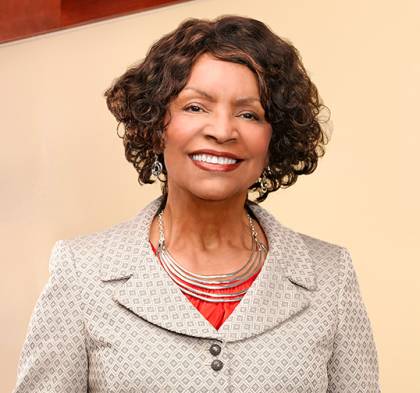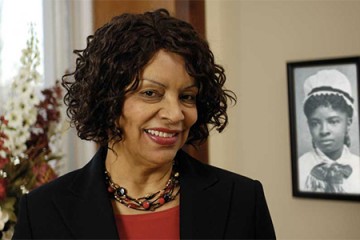- Name
- Johns Hopkins Media Relations
- jhunews@jhu.edu
- Office phone
- 443-997-9009
A key Johns Hopkins University initiative to increase and promote faculty diversity will be named to honor of the university's first Black woman to become a tenured professor, Fannie Gaston-Johansson.
The Target of Opportunity Program, which strives to augment the university's culture and overall excellence through the recruitment of diverse scholars, will be named the Fannie Gaston-Johansson Faculty of Excellence Program.

Image caption: Fannie Gaston-Johansson
"We are delighted to name this critical program to advance faculty diversity in honor of Fannie Gaston-Johansson," JHU President Ron Daniels said. "Through her research, mentorship, and public service, Dr. Gaston-Johansson has given countless patients a voice in their care, illuminated and addressed the pernicious impact of health disparities, and forged a path for other scholars from historically marginalized groups to flourish in the academy. We are fortunate that she made her academic home at Johns Hopkins and thrilled that this program named in her honor will allow us to welcome the next generation of talented scholars, clinicians, and scientists that follow in her footsteps."
The Target of Opportunity Program, now the Gaston-Johansson Faculty of Excellence Program, has been instrumental in helping Johns Hopkins increase faculty diversity since it was established in 2015 as part of the Faculty Diversity Initiative, resulting in the recruitment of 35 tenure-track faculty to the university over a six-year period. Overall, underrepresented minority representation on JHU's faculty increased from 8% in 2015 to 10% in 2019.
A new phase of the program—part of a $50 million investment that focuses on the recruitment, retention, and advancement of faculty who demonstrate a commitment to diversity and inclusive excellence as part of JHU's recently released Second Roadmap on Diversity, Equity, and Inclusion—will bring an additional 30 diverse scholars to Johns Hopkins. The program will concentrate on areas where diversity among faculty has lagged, with an emphasis on recruiting scholars in science, technology, engineering, and math fields. The hiring focus complements a similar effort launched last spring, the Vivien Thomas Scholars Initiative, designed to bring students from diverse backgrounds to the university to pursue PhDs in STEM disciplines.
"We looked at where we've made progress and where we've not made progress, where there's room for improvement," said Andrew Douglas, vice provost for faculty affairs, noting that recruiting diverse faculty in some areas—including natural and biological sciences—is more difficult than in others. An approach designed to create diverse faculty clusters in these areas, he said, would amplify the impact of the program, for faculty and students alike.
Roland J. Thorpe Jr., associate vice provost for faculty diversity and a professor at the university's Bloomberg School of Public Health, added: "We know that a diverse scientific workforce is better prepared to tackle more complex and nuanced problems in science. We also want to make sure that the diversity of our faculty is consistent with the diversity of the student body. We know that students of color really would like to have someone in their mentoring pool that is from a diverse background—if I see it, then I can achieve it."
The naming of the program stems from the ongoing work of the Diverse Names and Narratives Project, an effort with the goal of more visibly celebrating remarkable people from Johns Hopkins history, focusing on those from historically marginalized and underrepresented groups. The recommendation to honor Gaston-Johansson, approved by the JHU board of trustees, resulted from extensive deliberations by a cross-institutional task force of students, faculty, staff, alumni and community members.
"The individuals working on the Diverse Names and Narratives Projects are fully committed to making visible the contributions of individuals who are not currently fully recognized at Hopkins," said Katrina Caldwell, the university's chief diversity officer and vice provost for diversity and inclusion. "It is fitting that this group has selected to honor someone as accomplished as Dr. Gaston-Johansson for a program designed to attract faculty with the same demonstrated commitment to diversity and excellence."
In addition to being an internationally renowned educator and nurse researcher, Gaston-Johansson—who joined the Hopkins Nursing faculty in 1993—pioneered diversity initiatives in the School of Nursing and led the Minority Global Health Disparities Research Training Program, which allowed hundreds of underrepresented students access to research opportunities around the world. She also directed the Center on Health Disparities Research.
Her work focused largely on pain management, end of life care, and breast cancer, and she's known for developing the Pain-O-Meter, a tool to help patients find the right words to let clinicians know how much they were hurting.
Gaston-Johansson's name will be attached to an effort dedicated to advancing her own great strides to broaden the university's diversity. The Gaston-Johansson Faculty of Excellence Program recognizes that to be truly excellent, the university community must reflect the broad array of human differences. To that end, it aims to recruit and hire diverse scholars of any rank and from any background through assistance with salaries and other costs.
"My whole life has been about attracting diversity," said Gaston-Johansson, now a professor emerita. "I think recruiting and promoting diverse faculty scholars makes such an important difference in how you talk to people, how you understand people, and how you treat them."
"I think you have to have a host of experiences coming together with students and faculty, that's the way you really grow, not just educationally but socially, and you get a broader perspective on life."
More information about the program and the application process is available on the university's faculty affairs website.
Posted in University News
Tagged diversity










